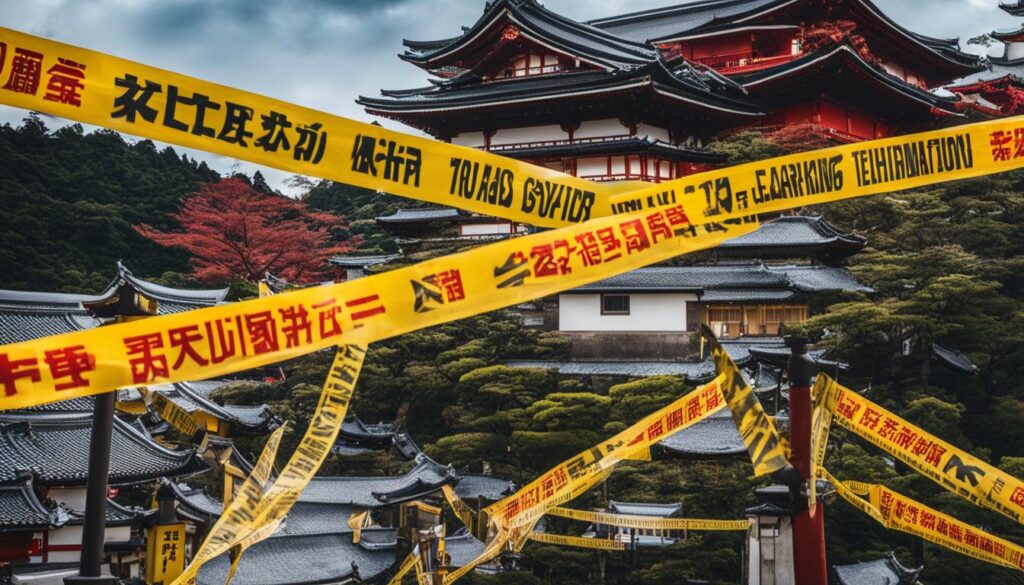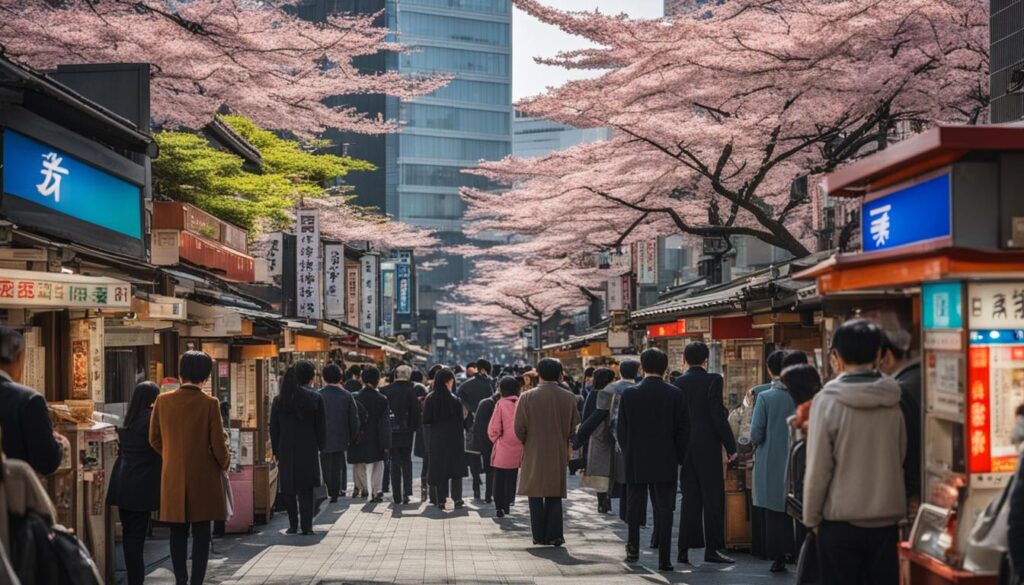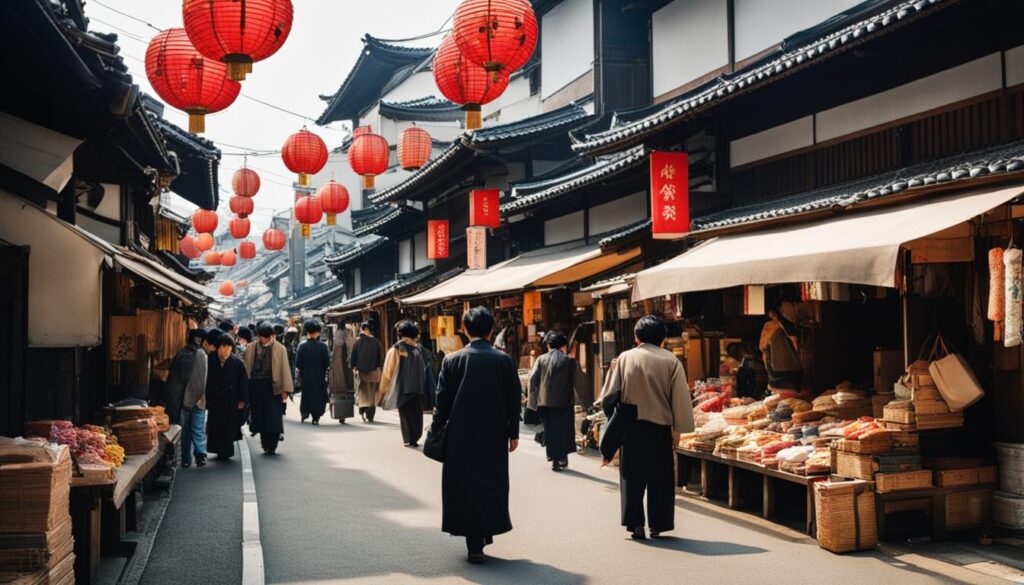If you’re planning a trip to Japan, it’s essential to be aware of the scams that tourists may encounter. Unfortunately, as with any popular tourist destination, there are people who seek to take advantage of unsuspecting travelers. Staying safe from scams in Japan should be a priority for any tourist, and with a little knowledge, you can navigate the country safely.
Japan travel scams come in many forms, from fake taxis to counterfeit goods, currency exchange scams, and accommodation scams. By understanding these common scams, you can take steps to protect yourself and avoid falling victim to fraudsters. Your safety and well-being are paramount, so it’s essential to be aware and stay vigilant during your trip.
In the next section, we will provide you with valuable tips to identify and protect yourself from scams in Japan. By following these tips, you can minimize the risk of being scammed during your trip and ensure a hassle-free travel experience. Let’s explore!
Tips to Protect Yourself from Scams in Japan
As a tourist in Japan, it’s important to be aware of potential scams that could put you at risk of losing money or personal information. By following these tips, you can identify and protect yourself from scams, ensuring a safe and enjoyable trip.
Research Common Scams
Before traveling to Japan, it’s essential to do your research on common scams that tourists may encounter. By knowing what to look out for, you can spot warning signs and avoid falling victim to fraudsters. Some examples of common scams in Japan include:
- Street merchants selling fake or overpriced products
- Currency exchange services offering unfair rates
- People pretending to be police officers and asking for personal information
- Fake taxi services charging exorbitant fares
Stay informed about these scams and others by reading travel blogs and guides, and ask locals or hotel staff for advice. Being knowledgeable about potential risks is the first step towards staying safe.
Be Alert for Warning Signs
Scammers often use similar tactics that can raise red flags if you know what to look for. Some warning signs to be aware of include:
- Unsolicited offers or assistance
- Pressure to make a quick decision or purchase
- Requests for personal information or payment before a service is provided
- Offers that seem too good to be true
By staying alert and trusting your gut instinct, you can avoid situations that may lead to scams.
Protect Your Personal and Financial Information
It’s essential to protect your personal and financial information when traveling in Japan. Here are some tips to keep in mind:
- Keep your passport and other important documents in a secure place
- Don’t share personal information with strangers, including your hotel name and room number
- Use ATMs located inside banks or convenience stores, and cover the keypad when entering your PIN
- Be cautious when making online purchases or bookings, and only use reputable websites
By taking these precautions, you can prevent scammers from accessing your sensitive information.
Find Reputable Services
When exchanging currency or using transportation services, it’s important to find reputable businesses. Look for companies that have positive reviews and a physical storefront or official website. When taking a taxi, make sure the vehicle has a meter and the driver displays an official license. By choosing reputable services, you can avoid being scammed by fraudulent businesses.
By following these tips, you can navigate Japan safely and protect yourself from potential scams. Remember to stay informed, stay alert, and prioritize your personal and financial security.
Currency Exchange Scams: Watch Out for Unfair Rates
When travelling to Japan, exchanging currency is a necessity, but it can also be a way for scammers to take advantage of tourists. Currency exchange scams are common and can result in travellers receiving unfair rates or even counterfeit money.
The most common currency exchange scam involves offering “no commission” rates, which are often too good to be true. This is because they make up for it by offering unfavourable exchange rates. To avoid this, always compare exchange rates between multiple providers and avoid exchanging money at airports or hotels, as they often charge higher rates.
Another tactic that scammers use is to offer to exchange money on the street or in a back alley. This practice is illegal in Japan and often results in receiving counterfeit notes or being robbed.
It’s crucial to only exchange currency at established foreign exchange services or banks in Japan. These providers offer fair rates and ensure that the currency is legitimate. Look for reputable exchange services in popular tourist areas, such as Tokyo’s Shibuya or Osaka’s Dotonbori.
| Do: | Don’t: |
|---|---|
| Exchange currency at established foreign exchange services or banks | Exchange money on the street or in a back alley |
| Compare exchange rates between multiple providers | Exchange money at airports or hotels |
| Look for reputable exchange services in popular tourist areas | Trust exchange providers offering “no commission” rates |
By following these tips and being cautious when exchanging currency, you can avoid falling victim to currency exchange scams during your trip to Japan.
Transportation Scams: Don’t Fall for Overcharging or Fake Taxis
Japan’s transportation system is renowned for its efficiency and punctuality, but unfortunately, it is not immune to scams. Tourists are often targeted by scammers who try to overcharge for taxi fares or offer unofficial “taxi” services that can put you in danger. By staying alert and following these tips, you can avoid falling victim to such transportation scams in Japan.
Tip 1: Use Official Taxi Services
When taking a taxi in Japan, it is always best to use official taxi services, such as those operated by Nihon Kotsu, Tokyo Musen, or Kokusai Motorcars. These taxis are recognizable by their standardized colors and markings and are equipped with a meter that calculates the fare based on distance and time. Avoid unmarked or “unofficial” taxis, which can often overcharge or take you to an undesirable location. If you’re unsure about the legitimacy of a taxi, it’s better to err on the side of caution and choose a different form of transportation.
Tip 2: Watch the Meter
Before getting into a taxi, make sure the meter is turned on and the fare starts at the initial rate of 410-730 yen, depending on the region. Ensure that the driver uses the shortest route to your destination, and if you notice any suspicious behavior, such as the driver taking a longer route or unnecessarily extending your ride, speak up and question them. Bear in mind that some drivers may not speak English, so it’s a good idea to have your destination written in Japanese to avoid any confusion.
Tip 3: Be Wary of Overcharging
Be aware that some taxi drivers may try to overcharge by taking advantage of tourists who are not familiar with the local area. Always check the fare when you reach your destination, and if it seems abnormally high, don’t hesitate to ask for a receipt and inquire about the breakdown of the charges. If you suspect that you have been overcharged, report the incident to the taxi company or police with your receipt and a description of the driver’s license plate number or ID.
Tip 4: Avoid Unnecessary “Services”
Some scammers may approach you while you are waiting for a taxi or walking in a busy area and offer to provide transportation services. These services are often unregulated, and the drivers may not have proper licenses or insurance. Never accept these types of offers, even if they seem cheaper than official taxi services. It’s better to use public transportation or a reputable taxi service that you know to be safe and reliable.
By following these tips, you can avoid transportation scams in Japan and enjoy a safe and stress-free journey. Always remember to stay vigilant, use official services, and don’t hesitate to ask questions or report suspicious behavior.
Shopping Scams: Protect Yourself from Counterfeit Goods
Shopping in Japan can be an exciting experience, but it’s important to be aware of the potential scams in this area. Counterfeit goods are a common problem, and tourists are often targeted by fraudsters trying to sell fake or low-quality products. To avoid falling victim to shopping scams in Japan, it’s essential to stay vigilant and take appropriate precautions.
Warning Signs of Shopping Scams in Japan
When shopping in Japan, watch out for the following warning signs of shopping scams:
- Unrealistically low prices
- Products that seem too good to be true
- Misleading branding or packaging
- Absence of a brand name or logo
- Outdated or incorrect labeling
If you notice any of these warning signs, it’s best to avoid the product or shop altogether. Always be cautious of deals that seem too good to be true, especially in tourist areas where scams are more prevalent.
How to Verify the Authenticity of Products
If you’re concerned about the authenticity of a product, there are several steps you can take to verify its legitimacy:
- Check the packaging and labeling for any misspellings or incorrect information.
- Look for a brand name or logo on the product and packaging.
- Compare the product with a similar item from a reputable store.
- Ask a salesperson or local expert for their opinion on the product.
By taking these steps, you can reduce the risk of purchasing counterfeit goods and ensure that you get the best value for your money.
Recommended Shopping Locations in Japan
To avoid shopping scams and find high-quality products, it’s best to shop at reputable stores and markets. Here are some recommended shopping locations in Japan:
| Location | Highlights |
|---|---|
| Ginza | High-end shopping district with luxury brands and department stores |
| Harajuku | Trendy area with unique fashion boutiques and vintage stores |
| Nakamise Shopping Street | Traditional market in Asakusa with souvenir shops and food stands |
By shopping at these locations, you can enjoy a safe and authentic shopping experience in Japan.
Accommodation Scams: Avoid Fake Listings and Hidden Fees
As a tourist in Japan, you need to be cautious of accommodation scams aimed at stealing your money or personal information. It’s essential to know how to spot these scams, so you don’t fall victim to them.
Identifying Accommodation Scams
One of the most common scams is fake listings. Scammers will create fake accommodation listings on popular travel websites and ask for payment in advance. Once you arrive at the location, you’ll realize that it doesn’t exist, or it’s not what you expected. To avoid this, make sure to:
- Research your accommodation options and read reviews from other travelers before booking.
- Verify the legitimacy of the rental company or individual by checking their website and contact information.
- Avoid making advanced payments without a reliable confirmation of the authenticity of your booking.
Another scam is hidden fees. Some accommodation providers may advertise a low rate, but once you arrive, they add extra charges for amenities or services that you thought were included. To prevent this, always read the fine print, ask about additional fees, and clarify the total cost before booking.
Tips to Identify Accommodation Scams
Here are some tips to help you identify accommodation scams in Japan:
- Be suspicious of unusually cheap or high-priced accommodation options, especially if they request immediate payment.
- Avoid booking from unknown or unverified sources.
- Verify the location and legitimacy of the accommodation using Google Maps or other reliable sources.
- Be wary of unsolicited emails or phone calls offering accommodation options.
Protecting Yourself from Accommodation Scams
To protect yourself from accommodation scams in Japan, follow these tips:
- Book accommodation through reputable websites or platforms that offer secure payment methods and verified listings.
- Use a credit card instead of a debit card to make payments, as it offers better protection against fraud.
- Keep copies of your booking confirmation and receipts.
- Report any suspicious activity or scams to the local authorities and your accommodation provider.
By being aware of the common accommodation scams and following these tips, you can avoid falling victim to fraudsters and have a safe and enjoyable stay in Japan.
Cultural Experience Scams: Be Cautious of Expensive Tea Ceremonies
While experiencing Japan’s rich cultural heritage is undoubtedly a highlight of any trip to the country, tourists should be wary of cultural experience scams. One of the most common scams is the expensive tea ceremony, where visitors are charged exorbitant fees for a traditional Japanese tea ceremony that is often performed by unqualified individuals.
To avoid falling victim to this scam, it is important to research and choose legitimate cultural experience providers. Look for reviews and recommendations online, and only book experiences through reputable travel agencies or official tourism websites.
Another warning sign to watch out for is inflated prices. While it is reasonable to pay a fee for a legitimate cultural experience, be wary of prices that seem too high. Some scammers may also try to pressure you into making a quick decision or paying upfront, so take your time and don’t feel rushed into anything.
If you do decide to attend a tea ceremony, be cautious of any hidden fees or additional charges. Take note of the terms and conditions before booking, and clarify any questions or concerns you may have with the provider beforehand.
By following these tips and being cautious of expensive tea ceremonies, you can fully enjoy Japan’s rich cultural experiences without falling victim to scams. Don’t let scammers ruin your trip and remember to stay vigilant at all times.
ATM Scams: Protect Your Financial Information
Japan is a relatively safe country, but that doesn’t mean tourists are immune to scams. One common scam that targets tourists is ATM scams. Fraudsters use various techniques to steal your financial information and gain access to your bank accounts. Here are some tips to help you protect yourself from ATM scams in Japan:
Choose ATMs in Safe Locations
When using ATMs in Japan, it’s important to choose machines that are in safe and well-lit locations. Avoid using ATMs that are in secluded or poorly lit areas, as these are more likely to be targeted by scammers. Instead, try to use ATMs that are located inside banks or shopping malls, where there are security cameras and other people around.
Be Cautious of Skimming Devices
Skimming devices are a common tool used by scammers to steal your debit or credit card information. These devices are attached to the ATM and can read your card’s magnetic strip when you insert it into the machine. To avoid falling victim to skimming devices, always examine the ATM before using it. Look for any signs of tampering, such as loose or mismatched parts. If you suspect that an ATM has been tampered with, don’t use it and report it to the authorities.
Shield Your PIN
When entering your PIN at an ATM, always shield the keypad with your other hand to prevent anyone from seeing your PIN. This is especially important in crowded areas or when using an ATM that is located outside. Scammers may use hidden cameras or other devices to capture your PIN, so it’s important to be vigilant and protect your personal information at all times.
Monitor Your Accounts
Even if you take all the necessary precautions, there’s still a chance that you may fall victim to an ATM scam. That’s why it’s important to monitor your bank accounts regularly to check for any unusual transactions. If you notice anything suspicious, report it to your bank immediately and take steps to protect your account.
By following these tips, you can protect your financial information and avoid falling victim to ATM scams in Japan. Remember to stay vigilant and be cautious when using ATMs, especially if you’re traveling in unfamiliar areas.
Online Scams: Stay Vigilant When Making Online Purchases
As a tourist in Japan, it’s important to be cautious when making online purchases. Scammers are known to create fake websites and listings to trick unsuspecting travelers into offering personal and financial information.
To protect yourself from online scams in Japan, keep the following tips in mind:
- Only use reputable websites and vendors that have a secure payment system.
- Do not click on links from unknown sources, as they may contain malware or phishing attempts.
- If a deal seems too good to be true, it probably is. Trust your instincts and do not fall for unrealistic offers.
If you do encounter an online scam, report it to the appropriate authorities and your bank as soon as possible. By staying vigilant and taking necessary precautions, you can enjoy a safe and secure online purchasing experience in Japan.
“In today’s digital age, it’s crucial to take extra steps to protect your personal and financial information when making online purchases, especially when traveling abroad.”
Conclusion
Now that you know what scams to avoid in Japan, you can explore the country safely and with confidence. Remember to stay vigilant and be on the lookout for warning signs to protect yourself from fraudulent activities.
Be proactive in protecting your money
One of the best ways to safeguard yourself while traveling to Japan is to be proactive about protecting your money. Be cautious when using ATMs and only use trusted currency exchange services. Avoid carrying large amounts of cash and keep your valuables close to you at all times.
Stay informed and aware
It’s important to stay informed and aware of the scams that target tourists in Japan. Keep up with the latest news and travel advisories, and don’t be afraid to ask locals or hotel staff for advice on how to avoid scams.
Enjoy your trip to Japan!
Despite the potential risks, Japan is a fantastic destination for tourists. By staying informed and using common sense, you can have a safe and enjoyable trip. Take advantage of all Japan has to offer, from the delicious food to the fascinating culture, and make unforgettable memories that will last a lifetime.

















































